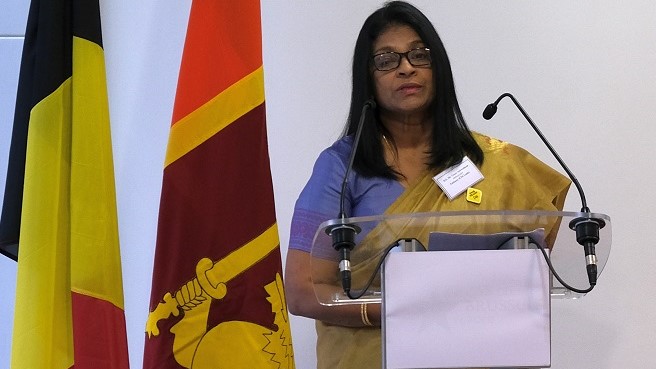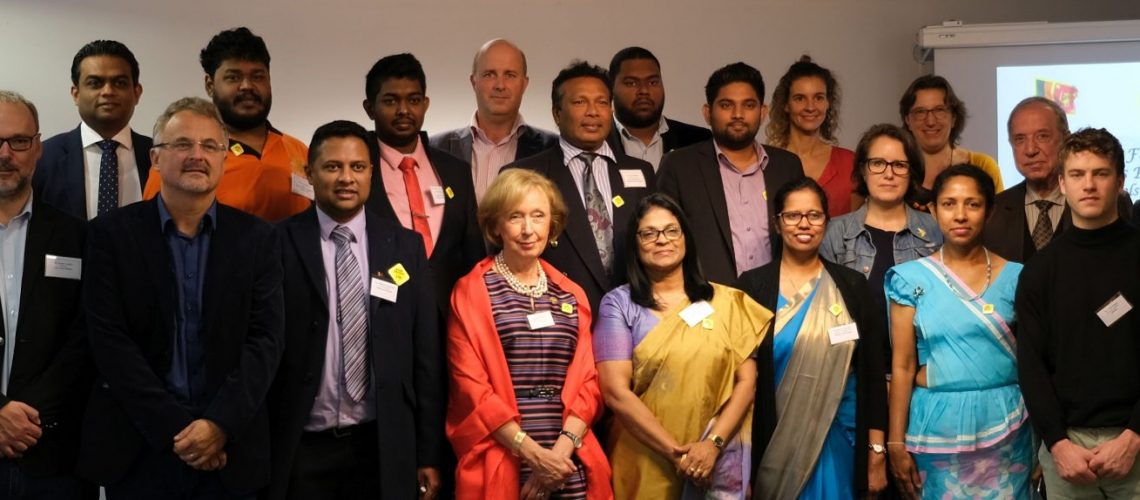Stimulate the demand for Sri Lankan fair trade products
Ambassador Grace Asirwatham Tweet
The annual Fair Trade Week boosts fair trade in Belgium. Sri Lanka’s enthusiastic Ambassador in Belgium aims to win the hearts of fair-trade-minded Belgians. The Ambassador brought together producers from Sri Lanka and potential Belgian buyers at the 2019 Fair Trade Week in Brussels.
Sri Lanka has exported fair trade and organic certified products to the international market for more than ten years, particularly to the United States but EU countries are also targeted. “Sri Lanka’s fair trade sector is small but lively and offers high-quality products, such as our famous cinnamon and Ceylon tea,” says Ambassador Grace Asirwatham. However, Belgium has remained a blind spot.
Starting collaboration

“Today we are organising a first event where Belgian and Sri Lankan businesses can meet. There are seven people representing dozens of farmers’ groups from across the country,’ continues the Ambassador.”
“This event is a first step. In coming years we want to build on the foundations that we are laying here. With the support of fair trade networks operating in Belgium, we want to stimulate the demand for Sri Lankan fair trade products. The European Union levies very low or even removed import duties on many Sri Lankan products because it is a vulnerable developing country which could interest potential buyers!’
“Our government strongly believes that this market holds potential for our businesses. That is why we help them get to know the needs and requirements of Belgian consumers to enable them to adapt their offer accordingly. It is also why we conduct research into consumer trends in the West.”
Obvious added value for farmers
Ambassador Grace Asirwatham: “Within the global trend for more sustainable food, fair trade plays an important role. All players in the supply chain must take their responsibility to allow farmers to really benefit from their work.”
“The Sri Lankan government wants to offer small and medium-sized enterprises the same opportunities as large enterprises. Exporting goods under fair trade conditions is a good way for them to earn more. Because fair trade is more direct, less added value is lost along the supply chain. The fair trade premium which the community can invest in infrastructure is an additional bonus for us as a government.”
Development through trade
“Our primary goal is to develop our economy,” says Ambassador Asirwatham. “To do so, we invest in infrastructure but also in scientific and technological development. New mechanisms such as the fair trade system help our country to develop. Authorities and the private sector work together to assist and support farmers and businesses.”
“In Sri Lanka’s national export strategy, fair trade is highlighted as one of the sectors to focus on. The government brings together all players to discuss how to best support fair trade. We gather and share information about export opportunities, about trade rules, about quality requirements of the international market, etc.”
“In the future I want to send a business delegation from Belgium to Sri Lanka. People who are familiar with the Belgian market can give valuable advice to our businesses. It is a way to gradually strengthen the ties. If we continue to work hard, I am convinced that in a year or ten we will be talking about sustainable win-win relationships between Belgian and Sri Lankan fair trade businesses,” concludes Ambassador Grace Asirwatham.
Exploring Sri Lanka’s fair trade offer
Pure spices: PODIE
One of the attendants was the People’s Organization for Development Import and Export – PODIE. It was established 30 years ago and tasked with improving the living conditions of smallholder farmers. PODIE only sells fairtrade-certified, organic spices and has many clients in the EU, particularly in France. The cooperative works with some 2500 family farms throughout Sri Lanka.
General director Tyrell Fernando: ‘We continuously invest in water facilities, sanitation, schools, etc. We also train farmers on fair trade conditions, environment-friendly crops and gender equality. This is financed with the fair trade premium and the profits generated by the organisation’s business activities. Through fair trade purchases a Belgian consumer really helps producers in Sri Lanka. Particularly if farmers own their business, which is the case.’
PODIE does not export to Belgium yet, but their spices can be found in France, for instance in the shops of Artisans du Monde.
A Sri Lankan traditional: SOFA tea
The Small Organic Farmers’ Association, or SOFA, processes and trades tea (and to a lesser extent also cocos, rice and spices) from 2600 smallholder producers owning maximum 5 hectares of land. Fair trade is obviously ingrained in this organisation, which is obvious from the fact it was the first Sri Lankan organisation to be certified by the Fairtrade Labelling Organization back in 1998.
From the onset, SOFA has offered its members loans and technical training. It supports farmers to become organic farmers and diversify their crops so their income does not depend on one single crop any more. Through close collaboration with the processing plant of BIOFOODS, the organisation helps create jobs in the region.
SOFA has used the fair trade premium towards purchasing agricultural implements, plants and cattle, among others.
In Belgium you can try Sofa tea by Ethiquable and Oxfam.
Colourful cotton: Selyn
Selyn brings together 550 mostly female artisans who work with cotton. They produce toys and cotton accessories for children as well as cotton jewellery and housekeeping textiles.
The founder, Sandra Wanduragala, started the business to keep alive the traditional know-how of Sri Lanka’s weavers and to promote job opportunities for women from rural regions. With the support of Selyn, which comprises basic equipment and machines such as looms and sewing machines, women can work from their home or nearby and contribute to the household’s revenue.
“For the upkeep of their family, many women in Sri Lanka are faced with the prospect of working abroad. Thanks to Selyn, women in my workshop can earn a living and work near their home,” says Seetha Ekanayake, the manager of one of the workshops with which Selyn works.
Many child items of La Pachamama and Oxfam are produced by Selyn.


